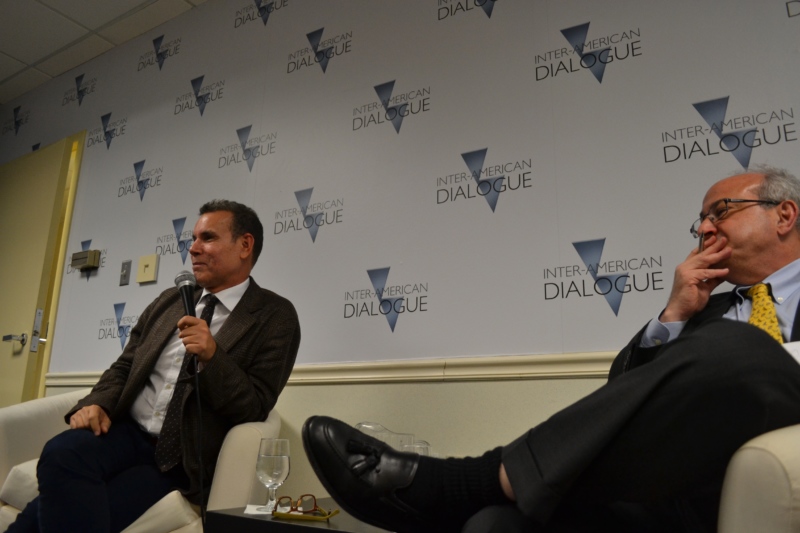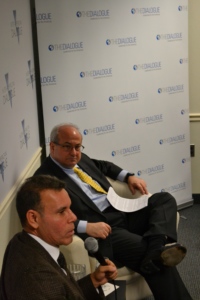Interpreting Venezuela’s Elections
 Photo by Ben Raderstorf / Inter-American Dialogue
Photo by Ben Raderstorf / Inter-American Dialogue
On December 6, Venezuelans gave the opposition Democratic Union a sweeping victory in the most anticipated Latin American legislative election in many years. The result of the vote, as well as how different groups in the bitterly polarized society react, and what happens in the weeks following will be pivotal for the country’s future. Although President Nicolás Maduro recognized the defeat, political tensions could well increase. The government will now be sharply divided and an institutional power struggle is likely.
In this context, the Inter-American Dialogue held a conversation with Luis Vicente León, president of Datanálisis and one of Venezuela’s most respected political observers, to interpret the results and share post-election scenarios. The exchange was moderated by Michael Shifter, President of the Dialogue.
León began by noting that the results were hardly surprising, given the deep economic problems Venezuela is facing. In any case, the resounding victory of the opposition was more the consequence of the unpopularity of the government of Nicolás Maduro and less a support for the electoral program of the Democratic Union. At the same time, he highlighted that Chavismo obtained more than 40% of the vote, closing the gap with the opposition during the last weeks of the campaign, despite one of the worst economic crisis in the country´s history.
In political terms, this election showed that for the first time in 17 years Chavismo is not a majority in Venezuela. This opens an opportunity for the opposition to build a strong alternative in future elections. In contrast, the defeat will increase opposition to Maduro inside Chavismo. León also noted that Chavismo is still favored by at least half of the country, even if Maduro is not.
For professor León, it is difficult to predict what will happen because the situation is very volatile, but there are three possible scenarios for Venezuela after the elections.
[caption id="attachment_45664" align="alignleft" width="188"] Photo by Ben Raderstorf / Inter-American Dialogue[/caption]
Photo by Ben Raderstorf / Inter-American Dialogue[/caption]The first scenario would be a political gridlock between the opposition and the government of Maduro, in which the Democratic Union attempts to use its majority to enact changes but its blocked by state institutions controlled by Chavismo. At least in theory, the supermajority obtained by the Democratic Union in the Assembly will give the opposition the necessary power to push for economic changes, for instance by approving a balanced budget and removing legal restrictions of the private sector. Additionally, the opposition could pass an amnesty law to liberate political prisoners. However, León noted that the Supreme Court –controlled by Chavismo– could block the amnesty if it rules that Leopoldo Lopez and other opposition leaders committed crimes against humanity by calling for demonstrations against the government. This would be the best scenario for Chavismo, if the opposition decides to wait until the next round of elections to gain more power.
The second scenario is a negotiation between the opposition and Chavismo, including the military. The new context of divided government –unprecedented since 1999– could be an opportunity for both sides to share the political cost of implementing unpopular but urgent economic reforms. In that regard, he noted that the private sector that finances the Democratic Union might push for moderation and pragmatic lawmaking, while the military could have a similar influence over the government. This would be the best scenario for Venezuelans, as it would allow some economic relief, but remains unlikely because of divisions between moderates and radicals in the opposition –a coalition of diverse parties- and Chavismo itself.
The third scenario is conflict. If the opposition becomes frustrated from its inability to enact reforms despite its triumph, radicals could become stronger and attempt to remove Chavismo from power before the next presidential elections in 2019, with a possibility of further chaos and violence. With a supermajority, the opposition could launch a recall referendum against Maduro –which could take place after April 2016- in order to remove him from office. Another possibility is for the Democratic Union to launch a Constitutional Assembly, which would undoubtedly need to increased political tensions and economic crisis. In this scenario, government control over the military and irregular armed groups could be critical.
Luis Vicente León describes these scenarios in more detail in a recent El Universal piece (Spanish).



















